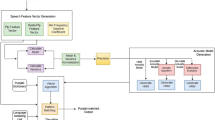Abstract
Adaptation techniques are necessary in automatic speech recognizers to improve a recognition accuracy. Linear Transformation methods (MLLR or fMLLR) are the most favorite in the case of limited available data. The fMLLR is the feature-space transformation. This is the advantage with contrast to MLLR that transforms the entire acoustic model. The classical fMLLR estimation involves maximization of the likelihood criterion based on individual Gaussian components statistic. We proposed an approach which takes into account the overall likelihood of a HMM state. It estimates the transformation to optimize the ML criterion of HMM directly using gradient descent algorithm.
Access this chapter
Tax calculation will be finalised at checkout
Purchases are for personal use only
Preview
Unable to display preview. Download preview PDF.
Similar content being viewed by others
References
Rabiner, L.R.: A Tutorial on Hidden Markov Models and Selected Applications in Speech Recognition. In: Readings in Speech Recognition, pp. 267–296 (1990)
Gauvain, L., Lee, C.H.: Maximum A-Posteriori Estimation for Multivariate Gaussian Mixture Observations of Markov Chains. IEEE Transactions SAP, 2:291–2:298 (1994)
Leggeter, C.J., Woodland, P.C.: Maximum Likelihood Linear Regression for Speaker Adaption of Continuous Density Hidden Markov Models. Computer Speech and Language, 9:171–9:185 (1995)
Gales, M.J.F.: Maximum Likelihood Linear Transformation for HMM-based Speech Recognition. Tech. Report, CUED/FINFENG/TR291, Cambridge Univ. (1997)
Machlica, L., Zajíc, Z., Pražák, A.: Methods of Unsupervised Adaptation in Online Speech Recognition. In: Specom. St.Petersburg (2009)
Povey, D., Saon, G.: Feature and Model Space Speaker Adaptation with Full Covariance Gaussians. In: Interspeech, paper 2050-Tue2BuP.14 (2006)
Visweswariah, K., Gopinath, R.: Adaptation of front end parameters in a speech recognizer. In: Interspeech, pp. 21–24 (2004)
Psutka, J., Müller, L., Matoušek, J., Radová, V.: Mluvíme s počítačem česky, Academia, Praha (2007) ISBN:80-200-1309-1
Gales, M.J.F.: The Generation and use of Regression class Trees for MLLR Adaptation. Cambridge University Engineering Department (1996)
Balakrishnan, S.V.: Fast incremental adaptation using maximum likelihood regression and stochastic gradient descent. In: Eurospeech, pp. 1521–1524 (2003)
Pollak, P., et al.: SpeechDat(E) - Eastern European Telephone Speech Databases, XLDB - Very Large Telephone Speech Databases (ELRA), Paris (2000)
Pražák, A., Psutka, J.V., Hoidekr, J., Kanis, J., Müller, L., Psutka, J.: Automatic Online Subtitling of the Czech Parliament Meetings. In: Sojka, P., Kopeček, I., Pala, K. (eds.) TSD 2006. LNCS (LNAI), vol. 4188, pp. 501–508. Springer, Heidelberg (2006)
Author information
Authors and Affiliations
Editor information
Editors and Affiliations
Rights and permissions
Copyright information
© 2013 Springer-Verlag Berlin Heidelberg
About this paper
Cite this paper
Vaněk, J., Zajíc, Z. (2013). A Direct Criterion Minimization Based fMLLR via Gradient Descend. In: Habernal, I., Matoušek, V. (eds) Text, Speech, and Dialogue. TSD 2013. Lecture Notes in Computer Science(), vol 8082. Springer, Berlin, Heidelberg. https://doi.org/10.1007/978-3-642-40585-3_8
Download citation
DOI: https://doi.org/10.1007/978-3-642-40585-3_8
Publisher Name: Springer, Berlin, Heidelberg
Print ISBN: 978-3-642-40584-6
Online ISBN: 978-3-642-40585-3
eBook Packages: Computer ScienceComputer Science (R0)




